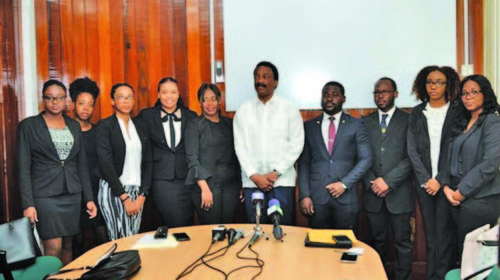
When it was announced that the Legal Affairs Ministry would be making full scholarships to the Hugh Wooding Law School (HWLS) available, there was much celebration. It turns out, however, that prospective awardees have been informed that they would have to give five years of service to the State.
Guyana Times International has been reliably informed by sources that at an interview with the Ministry, the University of Guyana’s top law students were informed that once they acquired fully-funded scholarships for two years of study in Trinidad, they had to stay in the State’s service for five years.
It is understood that this five-year service clause is causing some discomfort among the students. This is particularly so since in other fields of study such as medicine, students only have to serve back their years of study.
Last month, a delegation of law students had met with Attorney General Basil Williams. At the AG’s chambers, Vice President of the Guyanese Jurisdiction Committee, Olivia Bess, laid out the conditions under which aspiring lawyers have to study in Trinidad.
According to Bess, these students still have to find money for food; costs she estimates to be close to G$100,000 in Guyana currency. In addition, there are also the costs of accommodation.
“We requested a meeting with the Attorney General, because we as Guyanese students in Trinidad suffer a lot of financial difficulties in relation to our tuition fees, living expenses, food, etc. For example, the tuition fee has increased for the first years. It is no longer TT$98,366. It is now TT$101,066. When you exchange that to Guyana dollars, that would be G$3 million.”
“That’s just the first-year tuition fee. Added to that, you also have living expenses. The average Guyana student in Trinidad would pay around TT$3000. When you convert that, that would be around G$90,000 a month. And you still have to send it through the bank or Western Union and these places will add on their own rates.”
In terms of food, Bess noted that the average student would spend between TT$1500 and TT$2000 on a monthly basis. She explained that this translated to them spending between G$45,000 and G$60,000.
“So when you total all the expenses for one year, it is nothing less than G$5 million. That is just per year. It is two years so you have G$10 million. So, it’s not easy for the Guyanese students in Trinidad to function properly or study properly, even though we do perform well. But it’s not an easy task.
“We have to think about our parents, our guardians, how are they going to find that money? I know countless students who cried because they could not find that money to pay for Hugh Wooding Law School. It’s not an easy task.”
Bess was accompanied by students holding their Bachelor in Laws from the University of Guyana, as well as students already enrolled at the Hugh Wooding Law School. The Legal Affairs Ministry had announced that full scholarships to study law for the 2019/2020 year at Hugh Wooding were available.
This came after reports that the Ministry’s Finance Secretary failed to cover expenses for students. AG Williams criticised the staff who was responsible for sending money for the students in Trinidad, but didn’t.
The requirements for eligibility for the limited scholarships being offered by the Department of Public Service include: being the holder of the Bachelor of Laws Degree, with a minimum Grade Point Average (GPA) of 3.3, obtained within the last five years.
Applicants must be 35 years old or under; and must have an offer of acceptance from the Hugh Wooding Law School for the 2019-2020 academic year. Present students at the Hugh Wooding Law School must have passes for the first year of studies, with at least three courses passed with Grade A.
Over the years, the need for a local law school has been excessively highlighted and as such, Government has undertaken to set up such an institution here in a joint venture with Jamaican partners.



